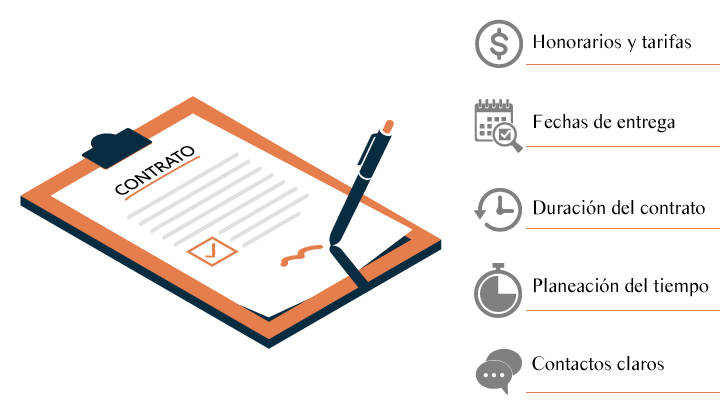Freelance contract: What is it and what is it for?

In general terms, a contract is a pact between two parties which stipulates certain obligations and rights that must be fulfilled reciprocally, likewise, we understand that a freelance collaborator is one who works independently or autonomously, now, this does not mean that the freelance collaborator walks around the company without limits or rules, quite the contrary! The freelance collaborator has described in detail his tasks and guidelines even long before starting his work. This begs the question: What is a freelance contract and what is it for? We will see.
Nowadays, companies have developed a taste for requesting specific results from their collaborators when executing a project, and it is there where those who do it under the freelance modality are present. Being freelance in Colombia opens up a wide range of possibilities in terms of the companies in which you can work, since this modality allows you to be present in several companies simultaneously. If you are a company and you use this modality, you will be able to have in less time and cost, several projects at the same time.
Table of Contents
What is a freelance contract?
The freelance contract helps you to avoid having a bad time with your collaborators or as a collaborator, it is important to be clear about the details and conditions of the work to be done and this is achieved by establishing the parameters of the labor contract. Freelance contracts are useful for both parties involved to be clear about the details and limits of the contract, so it is essential that it contains, at least, the following information
Fees and rates:
Both parties will have in mind from the outset, the money they will disburse or receive upon completion of the work.
Freelance fees and rates vary depending on the type of project and the market in which the freelancer operates. In general, freelancers can set their own rates, as they are not subject to a company’s compensation structures.
When a freelancer sets their rates, they must take into account several factors, such as their level of experience and skills, the complexity of the project, the time it will take to complete, and the competition in their area of work. In addition, it is important to take into account the fixed and variable costs associated with completing the project, such as equipment costs, office costs, and transportation costs.
It is important to note that freelancers can charge by the hour, by the project, or by a combination of both. For example, a graphic designer might set an hourly rate for the creation of a logo and a flat rate for the complete design of a website. On the other hand, a copywriter might charge per word or per article.
It is advisable for freelancers to research the prices that are being charged in their market to get a clear idea of the appropriate rates. It is also important to be transparent with clients about rates and to establish written agreements that include details about payment and delivery terms.
Delivery dates:
As a collaborator you will be able to plan in detail the execution of the work to be done.
Deadlines are a crucial aspect of freelance work. The work contract establishes a deadline for the delivery of the work and it is important to meet it in order to maintain a good working relationship with the client or employer.
It is important to keep in mind that the delivery date must be realistic and take into account the time it will take to complete the project and any unforeseen events that may arise. It is advisable to set a delivery date that allows the freelancer enough time to review and correct the work before final delivery.
It is critical to the success of a project to meet the deadlines established in the work contract. If the freelancer cannot meet the agreed delivery date, it is important to communicate immediately to the client or employer and set a new deadline together.
Duration of the contract:
This point provides mutual trust, since the duration of the project is known from the beginning. It brings certainty to the execution, since it reduces the risk, for both parties, of extending delivery dates, both of information on the part of the contractor and of the final result on the part of the collaborator.
The duration of a freelance contract will depend on the specific conditions of each project. Some projects may have a fixed duration, while others may be continuous or indefinite.
In general, it is advisable to establish an end date for the project in the employment contract. This can avoid confusion and ensure that the freelancer and the client or employer agree on the project timeline.
In some cases, the project may be extensive and require multiple phases or stages. In these cases, it may be desirable to establish specific delivery dates for each of the phases or stages of the project, as well as a final delivery date.
In some cases, the work contract may establish a specific duration, for example, a project that lasts one year or an ongoing collaboration for a specific period of time. In these cases, it is important to clearly state the terms and conditions of the employment relationship during that period.
Time planning:
Being a freelance collaborator you will have the opportunity to execute several contracts at the same time without losing sight of any of them. And from the contractor’s view, you can execute simultaneous contracts efficiently.
Time planning is a key aspect of freelance work. When working as a freelancer, it is important to be organized and manage time effectively to meet deadlines and deadlines set in the work contract.
To plan time effectively, it is advisable to create a calendar or agenda that allows you to visualize all pending tasks and projects, as well as the corresponding deadlines. In this way, priorities can be established and time can be distributed effectively to meet deadlines and deliver the work in a timely manner.
It is important to keep in mind that time planning must be realistic and take into account the time each task or project will take, as well as any unforeseen events that may arise.
Clear contacts:
When starting a project you must establish who will be the source and receiver of the information, so both parties will have the certainty that the information shared is accurate and the risk of misunderstandings and re-processing is minimized.

What is a freelance contract for?
In short, the freelance contract is the roadmap used during the execution of a project, both for the contractor and the collaborator, helping to establish prior to its development: duration, limits, obligations of the parties, costs and payments in terms of amounts and deadlines. It also helps to generate a part of confidence in the elaboration of the work, the contractor will know that what he requested will be done in the time and characteristics required and will start with established costs and the collaborator will know what he must do, how he must do it and how much he will receive for it.
To conclude, we can add that the freelance contract provides transparency to contracting processes and execution of projects, thus achieving fluidity in the development of specific jobs that require experience and knowledge that is not available within the company, making internal collaborators to fully develop their functions helping the company to meet the proposed objectives.